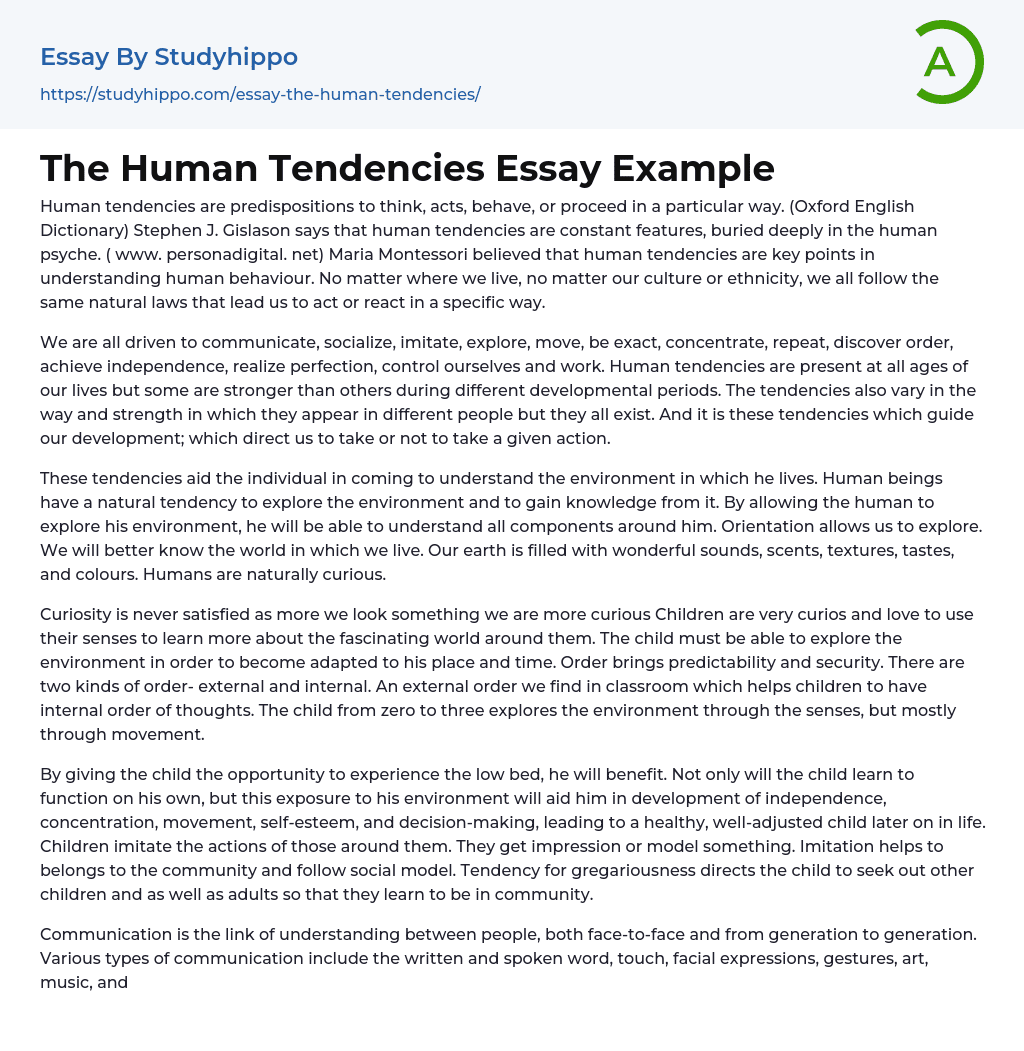Human tendencies are predispositions to think, acts, behave, or proceed in a particular way. (Oxford English Dictionary) Stephen J. Gislason says that human tendencies are constant features, buried deeply in the human psyche. ( www. personadigital. net) Maria Montessori believed that human tendencies are key points in understanding human behaviour. No matter where we live, no matter our culture or ethnicity, we all follow the same natural laws that lead us to act or react in a specific way.
We are all driven to communicate, socialize, imitate, explore, move, be exact, concentrate, repeat, discover order, achieve independence, realize perfection, control ourselves and work. Human tendencies are present at all ages of our lives but some are stronger than others during different developmental periods. The tendencies also vary in the way and strength i
...n which they appear in different people but they all exist. And it is these tendencies which guide our development; which direct us to take or not to take a given action.
These tendencies aid the individual in coming to understand the environment in which he lives. Human beings have a natural tendency to explore the environment and to gain knowledge from it. By allowing the human to explore his environment, he will be able to understand all components around him. Orientation allows us to explore. We will better know the world in which we live. Our earth is filled with wonderful sounds, scents, textures, tastes, and colours. Humans are naturally curious.
Curiosity is never satisfied as more we look something we are more curious Children are very curios and love to use their senses to learn more about the fascinating world around them. The child
must be able to explore the environment in order to become adapted to his place and time. Order brings predictability and security. There are two kinds of order- external and internal. An external order we find in classroom which helps children to have internal order of thoughts. The child from zero to three explores the environment through the senses, but mostly through movement.
By giving the child the opportunity to experience the low bed, he will benefit. Not only will the child learn to function on his own, but this exposure to his environment will aid him in development of independence, concentration, movement, self-esteem, and decision-making, leading to a healthy, well-adjusted child later on in life. Children imitate the actions of those around them. They get impression or model something. Imitation helps to belongs to the community and follow social model. Tendency for gregariousness directs the child to seek out other children and as well as adults so that they learn to be in community.
Communication is the link of understanding between people, both face-to-face and from generation to generation. Various types of communication include the written and spoken word, touch, facial expressions, gestures, art, music, and dance. Human are happy in conveying thoughts, feelings and information to each other. Generally people like to stay busy they like to be with others. Human like to belong to the group. We develop our understanding or uniqueness by being in the group. Human feel worthwhile through his work. Work leads to a feeling of accomplishment and self-respect. Instinctively we want to be precise in our work.
Doing something exactly right brings us satisfaction. Once humans work in their environment, they
can perfect their activities. In doing so, we are masters of our own minds and bodies as well as the tasks we set out to do. When we repeats a task over and over again it is begins to master the task, but even after master, we may continue to repeat the activity for the pleasure of doing it. Humans are able to visualize events that have not seen, we are able to feel and express emotions that are not material. We can imagine something that exists only in our minds, and then take the steps to make it happen.
We have an idea and we create something new what we saw. Human is able to generalise to create something on the basis on his experience. Tendencies exist in all humans from birth through all life they are always with us. They help humans to assimilate and adapt to their culture, to their time, place and group. Tendencies are natural way of helping each individual to explore, move, share with a group, to be independent and make decisions, create order, develop self-control, abstract ideas from experience, use the creative imagination, work hard, repeat, concentrate, and perfect.
Guided by tendencies at each stage of development, the child or young person seeks out the experiences in their environment that will best serve his development. Humans are seek to create order, to find meaning, to explore their environments, to communicate with those around them, to pursue activities that are meaningful, to become precise in their movements and in their thinking, and to work towards self-perfection. When these basic human tendencies of human are understood and respected, children become what Maria
Montessori called “normalized. When the human tendencies are blocked or somehow prevented from manifesting, children will behave with anger, an inability to concentrate. They will have problem to complete work which they set out to do. Children cannot handle frustration and make rational choices, cannot adapt to the environment. They have not self-discipline, self-control. The human tendencies are the basic force of energy behind the absorbent mind and the sensitive periods.
- Child essays
- Child labor essays
- Childcare essays
- Bacteria essays
- Biotechnology essays
- Breeding essays
- Cell essays
- Cell Membrane essays
- Cystic Fibrosis essays
- Enzyme essays
- Human essays
- Microbiology essays
- Natural Selection essays
- Photosynthesis essays
- Plant essays
- Protein essays
- Stem Cell essays
- Viruses essays




